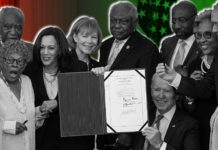I, like many “Americans,” sat in awe Wednesday. In the middle of the day, I saw deliberate demonstrations of unrest, anarchy and privilege at its finest. I was saddened and enraged, not just at the acts themselves, but at the admittance that deep down, I knew this was coming.
If you live with the ideology that history repeats itself, then you understand the fragility of privilege when it is faced with power. When fear consumes to the point of illogical oppression and tantrums, there is almost always destruction. I saw on my screen what can happen when those who are in both power and privilege can be allowed to demonstrate their frustrations in the most overt ways and the anger that swelled in me had no words, just sound.
I imagine that’s what my ancestors felt during the Civil Rights Movement when hoses were sprayed and dogs were sicced.
I imagine that’s what my ancestors felt when their businesses and homes were burned in Tulsa.
And I can only image the rage that is deep inside of a slave who runs away to “freedom.”
The internal pressure of wanting to demonstrate that same feeling of fragility that is reserved for one class and race of people can burn a hole in the hope that exists—the hope that this time things must be different.
And this time it is.
Instead of staying in the space that only sounds could understand, I did what many African Americans did yesterday. I compartmentalized my emotions and allowed my pain to fuel my purpose.
I currently mentor a teacher who is the complete opposite of the students she serves. She is a graduate of an Ivy league school and grew up on the West Coast in a two-parent household of professionals. Her students are the opposite, having a completely different experience with life in every sense of the word. Understanding the immense opportunity to provide her and the students she serves with the foundation that is needed for change, I reached out to her to ask how she would be spending instructional time tomorrow.
There wasn’t a question of IF she would spend time addressing the events of the night before in class, but a matter of HOW it would be done. Gone are the times in which the narrative of the Black experience can be bridled and stifled. Gone are the times where students are given a doctrine that isn’t also susceptible to be challenged. With the world at the fingertips of our youth, it is more important now than ever to equip them with the reality that their world is one in which this blatant US vs. THEM is unfolding—and we must talk about it.
I emphatically believe that to understand the essence of change is to understand the complex enterprise of the power and potential of people—and how people are the pendulum with which change occurs. It is the force of people that can determine the type of world we live in and, if we’re honest with ourselves, it is the preparation of our youth that can change the trajectory of our history.
I had to plan our conversation with clear action steps and reflective nuggets to ensure the rage inside didn’t spill into the container of the work ahead—work that needed to be facilitated by someone who doesn’t share the experience that allows her to connect with the wordless emotions.
In understanding that these nuggets are not just reserved for my mentee, it is only proper I extend to others who share the desire to challenge the dominant narrative, by any means necessary.
- If you’re a non-Black educator, you must name the experience, but don’t try to connect to it.
The shared experience of Black Americans was one that can’t be understood by one incident alone. While the attack on the Capitol evokes feelings of an attack on the foundation on which this country is built, it pales in comparison to what is understood by Black Americans: Our lives are dispensable and less valued by the dominant society when we aren’t allowed to protest unjust killings without the fear of dying, while others can protest unwanted leadership and be home for dinner that evening.
- Empower students to analyze and provide them with the tools to act.
Students in today’s classrooms aren’t taking your word for it just because you’re a teacher. They have access to information and technology that surpasses their understanding of its power. Provide students with the tools to use their voice to be heard, through writing, music, blogs, vlogs, collective action and in other collaborative ways. Support their ideas of change and use the varying areas of your individual privilege to leverage their voices.
Don’t stifle their voice to adhere to society’s level of “respectful” or “effective.” Those words suppress the raw truth of what’s happening, they devalue the richness of the vernacular in which we speak and they confine the narrative of our stories to be told HOW they want to hear it.
As a reminder, change didn’t occur when people adhered to the status quo or the standards of the dominant society. Ensure your students know that!
- Use your individual privilege to enact real change.
There is an element of freedom that exists in privilege—one that each one of us has, regardless of our race. I enact my own privilege daily by using my experience and education that has afforded me opportunities to speak truth in spaces that otherwise wouldn’t hear it.
As an educator, use the tools you have to empower your students beyond a social studies or current events lesson of the day. Evoke change in the hearts of those who will hear you and provide space for students to see your call to action beyond your instruction.
- Examine words and images to spark conversations that promote analysis and research.
A picture is worth a thousand words—use words and pictures together to analyze the narrative of society. Juxtapose images from the events at the Capitol to the protests of the Civil Rights Movement or the lives lost in various occurrences over the years by the hands of authority.
Use a virtual gallery walk with students, encouraging conversations about the context of the images they see. Combine word work within activities like this, where the connotation of words like “thug” and “protestor” are examined through the various perspectives of our society.
Being an educator during this time is paramount—from the string of events that built up to yesterday to the pandemic that limits the mobility of millions (emotionally, physically and mentally). It may feel like too much to bear the weight of being responsible for a generation of change agents but, I implore you to lean into this space, knowing that you are appreciated. Besides the reflections that are necessary to empower students in this day and time, resources like The Black Inquiry Project are great places to start to begin the conversations that are necessary for change.










